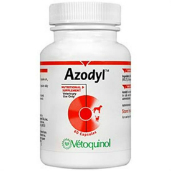The leading cause of death in older
cats is chronic kidney failure. Owners should have a basic understanding of this condition so they know what can be done to help their cats in the unfortunate event that they develop this serious disease.
The kidneys play multiple roles in the body. They are responsible for filtering waste products out of the blood and for conserving water and returning it into the circulatory system. They also help balance electrolyte levels, produce a hormone that stimulates red blood cell production, and are a part of the system that regulates blood pressure.
"Chronic kidney failure is a progressive
disease but the speed with which a cat's condition deteriorates is
extremely variable."
Chronic kidney failure occurs when the kidneys gradually lose their ability to perform these functions. This may come about because of the accumulated wear and tear on the kidneys occurring over a long feline life, specific events that resulted in significant kidney damage (e.g., ingestion of antifreeze containing ethylene glycol), abnormal kidney development, or some combination thereof.
Diagnosing Feline Chronic Kidney Failure
The most common symptoms associated with chronic kidney failure in cats are:
- Dehydration
- Lethargy and depression
- Behavioral changes
- Loss of appetite
- Increased thirst and urination
- Weight loss and muscle wasting
- Vomiting (possibly containing blood)
- Diarrhea (possibly dark
and tarry, indicating the presence of digested blood)
- Oral ulcers
- Bad breath
Some cats may also develop respiratory difficulties, blindness, seizures, and abnormal bruising.
To definitively diagnose chronic kidney
failure and rule out other diseases that can cause similar symptoms,
a veterinarian will run routine panels of blood work and perform a urinalysis. Typical findings include dilute urine and increased levels of blood urea nitrogen (BUN) and creatinine in the blood. In more advanced cases, cats may also have anemia (i.e., a low red blood cell count) and high
levels of phosphorous and low levels of potassium in their blood.
Additional testing may be necessary to reveal the underlying reason
for an animal's poor kidney function, but in many cases, the cause
is never determined.
Treating Chronic Kidney Failure in Cats

Treatment for chronic kidney failure
can include fluid therapy, special diets,
kidney supplements for cats like
Azodyl, and pet
medications to treat high blood pressure, excessive gastric acid secretion (Cimetidine), anemia, and to increase potassium and decrease phosphorous levels in the body. Patients are usually hospitalized until they have recovered to the point where they can be sent home for their owners to continue long term, maintenance therapy. Kidney transplants may be an option for cats that meet specific criteria.
Chronic kidney failure is a progressive
disease but the speed with which a cat's condition deteriorates is
extremely variable. Some animals live happily for many months or even
years with little treatment, while others may not survive their initial
hospital stay. In the end, euthanasia is often required once a cat's
quality of life has declined to an unacceptable level and he is no longer
responding to treatment.
The above is provided for information purposes only and should not be used for the diagnosis or treatment of any condition.
This information does not cover all possible variables, conditions, reactions, or risks relating to any topic, medication, or product and should not
be considered complete. Certain products or medications may have risks and you should always consult your local veterinarian concerning the treatment of
your pet. Any trademarks are the property of their respective owners.